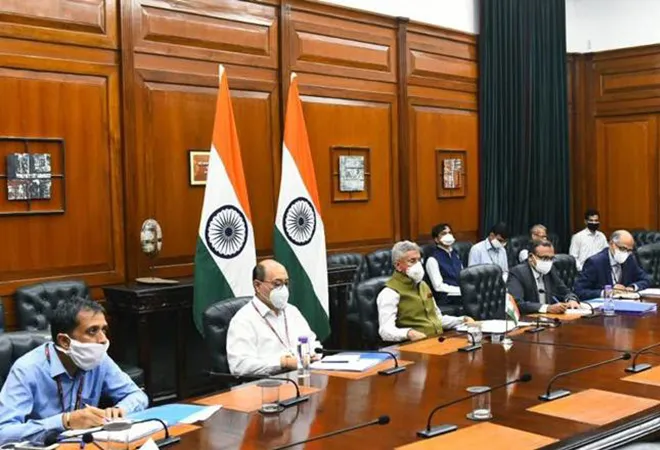
At the end of April 2020, the BRICS foreign ministers met via video conference in a meeting led by Russian Foreign Minister Sergei Lavrov, in Russia's capacity as the current chair. Quite unsurprisingly, much of the discussion revolved around COVID-19 and the response of BRICS members to it.
At a time when international organisations — from United Nations to G7 to the EU to
G20 — have come under fire for failing to mount a collective response to the pandemic, the BRICS foreign ministers meeting once again stressed the importance of a ‘
multilateral approach.’ It is no surprise that this approach has been espoused, given that collective action has been the means for BRICS to achieve national interests and increase their say in institutions of global governance.
At the same time, BRICS does not have the ‘
strategic vision’ to deal with ‘global matters’ on its own. For this, it relies on other international organisations, like throwing its support behind the G20 when the latter came together to deal with the 2008 financial crisis. Since then, the global situation has undergone significant shifts.
The post-2008 crisis world has been characterised by a sustained backlash against lopsided benefits accrued via globalisation, rise of populism and an increased antipathy towards multilateral dealings by the US — the leading power in several international institutions.
The rise of China and its resultant impact on the world order has raised questions about the impact of a rising power on multilateral processes. The post-2008 crisis world has been characterised by a sustained backlash against lopsided benefits accrued via globalisation, rise of populism and an increased antipathy towards multilateral dealings by the US — the leading power in several international institutions. This has further come under the scanner amid the pandemic as the US leadership — which had been on display during the 2008 crisis and the 2014 Ebola crisis — has been conspicuously missing.
It must be noted that multilateral frameworks were under stress even before the pandemic hit. What the COVID-19 is expected to do is to exacerbate the already prevailing trends when it comes to multilateralism, especially the ones in which the US is a leading member. Having long been used by
strong states to further their influence, the post World War II multilateralism had been largely ‘
American-centric.’ It is the rise of other powers that are now questioning this arrangement in order to cement their position and derive resultant benefits without alienating the major powers.
But what do these developments mean for multilateral organisations that are not driven by a US membership — how does the post-COVID-19 world order impact their functioning and agenda, seen through the case of BRICS.
What the COVID-19 is expected to do is to exacerbate the already prevailing trends when it comes to multilateralism, especially the ones in which the US is a leading member.
Here, the key will be to focus on two aspects of multilateralism — the impact of any future decline of global international institutions on prospects of BRICS cooperation as well as the internal dynamics of BRICS members and what it means for its existence as a multilateral institution in the short to medium term.
Why multilateralism matters for BRICS
For some time now, ‘weaker states’ have sought to set up multilateral institutions ‘suited to their own specific goals and
identities,’ removed from the global hegemonic order. Unlike a hegemonic power, emerging powers find it difficult to strike out on their own and hence rely on multilateral institutions to achieve their goals. In a similar vein, for the past decade, BRICS countries have sought to improve coordination of issues of mutual interest. This continued BRICS cooperation has been based on specific calculations made by the member-states in terms of their defined national interests and achievement of foreign policy goals. The main
causes include reform of Bretton Woods institutions, enhance regional power of individual member states, help in achievement of foreign policy goals of individual member states as well as increase cooperation with the rising power to ‘bind’ it among formal institutional structures.
This has led to annual summit meetings of the heads of state, establishment of the New Development Bank, setting up of the Contingency Reserve Arrangement — as some of the key achievements — with the NDB receiving ‘
AA+ long-term issuer credit ratings from S&P and Fitch and AAA foreign currency long-term issuer rating from Japan Credit Rating Agency (JCR).’ Also, the countries have made a collective demand for reform of global financial institutions and even coordinated positions at the G20 summit. In fact, ‘strengthening and reforming the multilateral system’ remains a key principle of cooperation among BRICS, as is evident from the 2019
Brasilia summit declaration. This highlights not just overlapping concerns among BRICS countries, but also the extent to which cooperation is based on activities of other multilateral institutions. Given that BRICS countries on their own are not in a position to mount global efforts to deal with large-scale crisis, a paralysis at the level of other multilateral institutions negatively affects agenda formation in BRICS. This takes place through an undermining of the strategic calculation that had led member states to cooperate within the BRICS framework to achieve the benefits accrued through a collective approach in international organisations.
Given that BRICS countries on their own are not in a position to mount global efforts to deal with large-scale crisis, a paralysis at the level of other multilateral institutions negatively affects agenda formation in BRICS.
The ongoing churn in the world order, further complicated by the pandemic sweeping through the world, has however raised concerns about future policy directions of BRICS member states and its eventual impact on the organisation as a whole. If the US-China rivalry intensifies, the already complex dynamics between India and China, India’s balancing act with the US, the growing Russia-China linkages, Russia-US tensions — raise the prospects of an ‘internal
split.’
Even if it does not come to that, gaining consensus on an expanded agenda for BRICS will only become tougher in the short term due to the combination of international and national factors. This factor will also have to contend with the impact of the pandemic on the BRICS economies, with expectations of decline estimated to be around 5
percent or more, and the pace of recovery. The IMF estimates the following impact on real GDP of BRICS countries:
Real GDP, annual percentage change:
|
2019 |
2020 |
2021 |
| Brazil |
1.1 |
-5.3 |
2.9 |
| Russia |
1.3 |
-5.5 |
3.5 |
| India |
4.2 |
1.9 |
7.4 |
| China |
6.1 |
1.2 |
9.2 |
| South Africa |
0.2 |
-5.8 |
4.0 |
Source: IMF
Here, at present, the decision to get the New Development Bank to ‘create a dedicated lending tool to finance economic recovery projects in the BRICS countries’ to the tune of $15
billion is a welcome step though far from adequate given the magnitude of economic distress. It is for precisely this reason — its limited capacity — that the BRICS has called for a multilateral approach to involve other major economies in dealing with the crisis.
The decision to get the New Development Bank to ‘create a dedicated lending tool to finance economic recovery projects in the BRICS countries’ to the tune of $15 billion is a welcome step though far from adequate given the magnitude of economic distress.
Already, the optimistic projections for the original BRIC economies have not been borne out in totality, with economic
growth rates varying across the board. All of these challenges mean BRICS has not become the centerpiece of an alternative world order and has not had ‘a significant impact on global developments or role in evolution of world
system,’ hindered by the diverging ‘interests and horizons of its member
countries.’
An uncertain future?
In the past five years, BRICS has managed to begin a process of institutionalisation as well as increased intra-BRICS cooperation in areas like health, science and technology, environment, finance, trade, agriculture, etc. (at the ministerial, sectorial and senior official level). This has also meant that despite the differing foreign policy positions in several areas, BRICS had remained an important arena for ‘discussing the prospects of geopolitical
evolution.’ Also, despite its shortcomings, in a time of an evolving world order, a continued format for discussion among emerging powers has been ‘worth
maintaining.’
These gains, however, will be difficult to sustain if the member states cannot provide the levels of domestic economic growth that ‘provides the basis for their
international positions.’ Already, questions are being raised about ‘limitations to further
integration’ following the establishment of the NDB. Even geopolitically, it has not figured as ‘an independent variable in analysis of international
relations’ due to the combination of factors discussed above.
The role of other emerging powers, their foreign policy choices in an evolving global order and response to the US-China equation will affect multilateral behaviour, including that of BRICS.
Till now, despite the economic strength China wields, it has not sought to assume a dominant position within the organisation, clearly understanding the limitations posed on such a posture by the member states. But a heightened rivalry with the US and the opportunity the pandemic offers to push for changes in the world order has the potential to upset this balance, leading to changes in how the two countries position themselves in multilateral institutions and affect rule-making within these bodies. The role of other emerging powers, their foreign policy choices in an evolving global order and response to the US-China equation will also affect multilateral behaviour, including that of BRICS.
Whether it can manage the internal contradictions among its members while also simultaneously expanding its agenda to become a more consequential voice at the international level, will determine its success in the coming years even as the collective response of BRICS to the pandemic remains to be seen. In other words, it will be nature of world order that eventually emerges that will determine the future of BRICS and not the other way round. This makes the ongoing churn in the global order especially relevant for BRICS and its future as a multilateral organisation.
The views expressed above belong to the author(s). ORF research and analyses now available on Telegram! Click here to access our curated content — blogs, longforms and interviews.



 At the end of April 2020, the BRICS foreign ministers met via video conference in a meeting led by Russian Foreign Minister Sergei Lavrov, in Russia's capacity as the current chair. Quite unsurprisingly, much of the discussion revolved around COVID-19 and the response of BRICS members to it.
At a time when international organisations — from United Nations to G7 to the EU to
At the end of April 2020, the BRICS foreign ministers met via video conference in a meeting led by Russian Foreign Minister Sergei Lavrov, in Russia's capacity as the current chair. Quite unsurprisingly, much of the discussion revolved around COVID-19 and the response of BRICS members to it.
At a time when international organisations — from United Nations to G7 to the EU to  PREV
PREV


